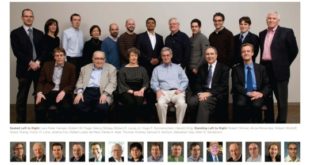Att bli gammal — några visdomsord Hjälp mig att inte repetera ändlösa detaljer, ge mig vingar som för mig till saken! Försegla mina läppar angående mina krämpor och besvär. De tilltar och det känns alltmer frestande att älta bekymren. Jag vågar inte be om ett förbättrat minne men jag ber om växande ödmjukhet och mindre tvärsäkerhet när mitt minne inte stämmer med andras. Lär mig den strålande läxan att jag tar fel ibland. Låt mig få bli någorlunda...
Read More »Wie eine höhere Vermögenssteuer die Wirtschaft verbessern kann
Wie eine höhere Vermögenssteuer die Wirtschaft verbessern kann Das Deutsche Institut für Wirtschaftsforschung (DIW) in Berlin hat Rechnungen für eine Vermögensteuer in Höhe von einem Prozent angestellt, wie sie derzeit politisch diskutiert wird. In dem Modell gilt ein Freibetrag in Höhe von einer Million Euro für Privatpersonen und von fünf Millionen Euro, wenn diese in einem Betrieb stecken. Das bedeutet: Privatleute müssen die Steuer bezahlen, wenn sich...
Read More »The teaching of economics — captured by a small and dangerous sect
The teaching of economics — captured by a small and dangerous sect The fallacy of composition basically consists of the false belief that the whole is nothing but the sum of its parts. In society and in the economy this is arguably not the case. An adequate analysis of society and economy a fortiori can’t proceed by just adding up the acts and decisions of individuals. The whole is more than a sum of parts. This fact shows up when...
Read More »Barn av vår tid
Barn av vår tid .[embedded content] .[embedded content] Ulf Dageby (1944-2024) In Memoriam
Read More »Proud father (personal)
My youngest daughter, after a couple of years of tough studies and hard work, last week succeeded in getting into her highly sought-after program. You never gave up. You never gave in. Congratulations, Linnea! [embedded content]
Read More »Kraftwerk
.[embedded content]
Read More »Financial economics — science or chance?
Financial economics — science or chance? Those of us who occasionally follow stock markets worldwide are usually well aware of the fact that ‘winners’ in these markets are largely the result of the harvest of chance. Occasionally, however, one hears so-called day traders express the view that it surely cannot be a question of pure luck that some stock traders consistently make winning transactions in the market. To test the sustainability of these...
Read More »Tax the rich!
.[embedded content]
Read More »Summer
Leave the city, go out to our summer residence in the Karlskrona archipelago, open the doors to the terrace, sink into the recliner with a cup of coffee, and just enjoy these wonderful tones flowing from my old Thorens record player… [embedded content]
Read More »Judith Butler — the art of branding fashionable mumbo jumbo
Judith Butler — the art of branding fashionable mumbo jumbo .[embedded content] Judith Butler’s theory of identity rests on the idea that there is nothing between the Scylla of the metaphysical ‘modernist’ subject and the Charybdis of the totally deconstructed identity where the subject becomes nothing but a fictitious fantasy. But this can’t be right. The social constructivist anti-essentialism is unsatisfactory and ends up in an idealist ‘slippery slope.’...
Read More » Lars P. Syll
Lars P. Syll


